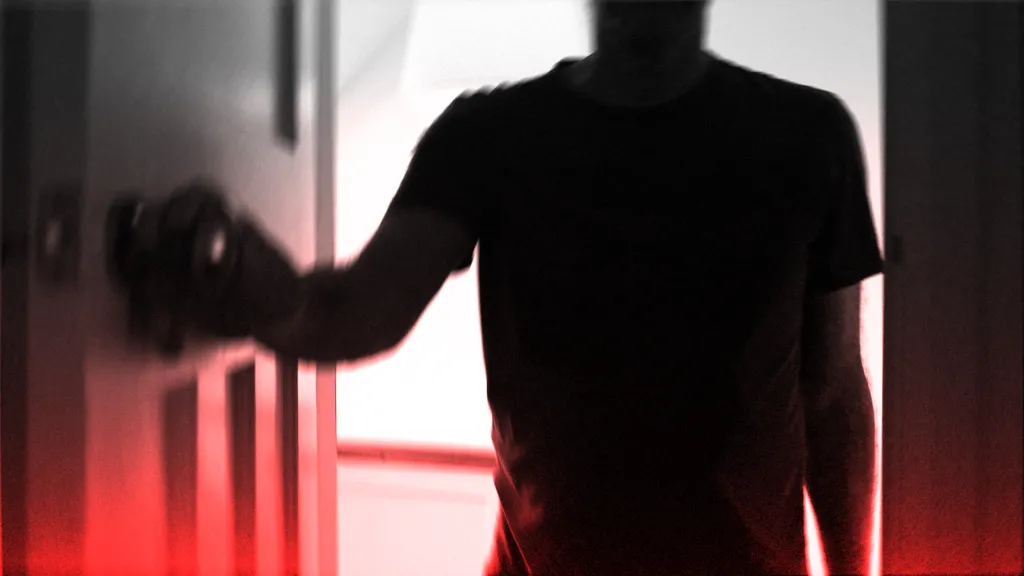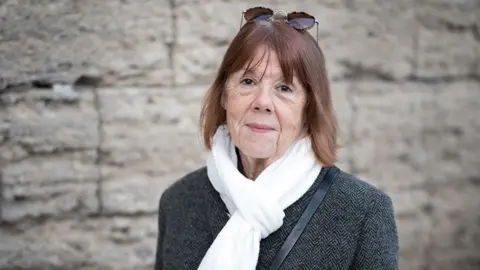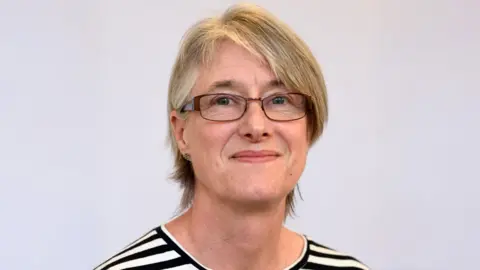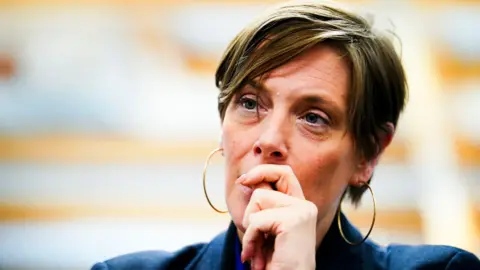
 Getty Images
Getty ImagesWhen Kate and her husband sat down one evening to have a chat, she could never have prepared for what he was about to tell her.
"I have been raping you. I've been sedating you and taking photographs of you for years."
Kate (not her real name) was speechless. She sat there frozen. She couldn't comprehend what he was saying.
"He just told me as if it was, you know: 'We're going to have spaghetti bolognese tomorrow for dinner, is it all right if you pick up the bread?'"
Warning: This story contains descriptions of sexual violence
For years, behind closed doors, her husband had been controlling and abusive. He was violent and misused prescription pills.
There had also been occasions over the years where Kate had woken up to find him having sex with her, something she couldn't consent to, because she was asleep. This was rape.
He would be remorseful afterwards, convincing her he had been asleep and didn't know what he was doing. He was ill and there must be something wrong with him, he had told her.
Kate supported him in getting help from medical professionals.
But she had no idea at the time that he had been spiking her tea at night with sleeping medication, so he could rape her as she slept.
After his confession, he told her that if she went to the police his life would be over. So she didn't.
This was her children's father. She didn't want to believe that someone she had shared her life with could be capable of wanting to hurt her so badly.
However, over the next few months the horror of what he said he had been doing to her started to have a physical effect.
Kate says she became very ill, her weight plummeted, and she began having panic attacks.
Nearly a year after the confession, during a particularly bad panic attack, Kate told her sister everything.
Her sister called their mother - who called the police. Kate's husband was arrested and questioned.
Four days later, however, Kate contacted Devon and Cornwall Police saying she didn't want to progress with the case.
"I just wasn't ready," she says. "There was a grief. Not just for me, but for the children. Their dad would never be who he was."
Nevertheless, Kate didn't want her husband in the house any more, and he moved out.
After this, she began to think more clearly about what had happened. Six months later, Kate went back to the police.
An investigation began, led by Det Con Mike Smith.
Kate says the detective helped her understand she was the survivor of a serious crime: "He helped give me my power back. I didn't consciously realise that I'd had it taken away. He explained that it was rape."
 Getty Images
Getty ImagesHer (now ex-) husband's medical records provided a crucial piece of evidence. After his confession to Kate, he had paid privately to see a psychiatrist.
During the session he described "drugging his wife in order to have sex with her while she was asleep". The admission was recorded in the psychiatrist's notes.
Kate says her husband also confessed to some people at Narcotics Anonymous, as well as friends at the church they both attended.
Police files on the case were eventually presented to the Crown Prosecution Service (CPS) but it decided not to press charges.
Kate couldn't understand why.
"I thought, if you have not got enough evidence in my case to convict, with confessions from the perpetrator, then how does anybody else stand a chance?" she says.
Devastated, she applied for a formal review of the CPS's decisions. Six months later, the CPS said that her ex-husband would now be charged. It also admitted that "the original decision taken by our charging prosecutor was flawed".
"While we get the vast majority of our charging decisions right the first time, this was not the case here and we apologise to the victim for the distress this will have caused," a CPS spokesperson told File on 4 Investigates.
 University of Bristol School for Policy Studies
University of Bristol School for Policy StudiesThe case went to court in 2022, five years after Kate's ex-husband had made his confession to her.
During the trial, he claimed Kate had a sexual fantasy of being tied up in her sleep and woken up in that position to have consensual sex. He admitted drugging her, but said it was so he could tie her up without waking her. He denied it was so he could rape her, but the jury didn't believe him.
"I saw it as being absolutely preposterous," says Det Con Smith. "This is the most traumatic thing in her life and they were very much painting her as a fully engaged party for some sort of sexual kink."
After a week-long trial, the ex-husband was found guilty of rape, sexual assault by penetration and administering a substance with intent.
In sentencing, he was described by the judge as "a self-obsessed person, endlessly prioritising his own perceived needs", who had shown "no real personal remorse".
He was sentenced to 11 years in prison and given a lifelong restraining order.
If you have been affected by any of the issues raised in this story, information and support can be found at the BBC's Action Line.
Three years on, Kate is trying to rebuild life with her children. She has since been diagnosed with post-traumatic stress disorder (PTSD) and a neurological disorder, caused by the trauma she went through.
Kate sees similarities between her case and that of Gisèle Pelicot, the French woman whose ex-husband drugged and raped her, and also recruited dozens of men to abuse her.
"I remember at the time just hoping and praying that she gets the support and the validation that she needs," Kate says.
"Chemical control" is the term now being used for domestic abusers who use medication as a weapon. "It's probably quite widespread," warns Prof Marianne Hester from the University of Bristol's Centre for Gender and Violence Research.
"I always think of it in terms of the abuser's toolkit," she says. "If there are prescription drugs in the house, is the perpetrator actually using them as part of the abuse in some way?"
 PA Media
PA MediaOffences such as spiking are being under-recorded in part because of changes to how police record crimes, says Dame Nicole Jacobs, the Domestic Abuse Commissioner for England and Wales.
"If ministers want to ensure that the measures they put in place to halve violence against women and girls over the next decade are reducing harm, then we must accurately measure all domestic abuse related crimes reported to the police," she says.
"This is critical to not only ensuring perpetrators are held to account, but so that victims get the necessary help they need to rebuild after abuse."
The Home Office told us that it is developing police software which will be able to identify spiking incidents which occur as part of another crime.
Under the Crime and Policing Bill currently going through Parliament, the government is creating what is described as a new, "modern" offence of "administering a harmful substance, including by spiking" - to encourage victims to report to police.
Spiking is already a crime throughout the UK, covered by other pieces of legislation - including the 1861 Offences against the Person Act.
Under the new law - to apply in England and Wales - perpetrators will face up to 10 years in jail.
The Ministry of Justice says the creation of a specific offence will help police to keep track of spiking, "and will encourage more victims... to come forward and report these crimes".
Jess Phillips - the minister for safeguarding and violence against women and girls - called spiking "a vile crime that violates victims' confidence and sense of safety", in a statement to File on 4 Investigates.
Discussions are under way to extend the law to Northern Ireland.
The Scottish government says it has no current plans to create a specific offence but is keeping the situation under review.
Kate eventually received justice. But her ex-husband wouldn't be in prison if she hadn't taken on the CPS when it didn't believe the case showed a realistic chance of conviction.
"I want other people to understand that abuse happens a lot more quietly than you think," says Kate. "I'm still learning properly what happened to me and how that's affected me."

19 PerFlyer